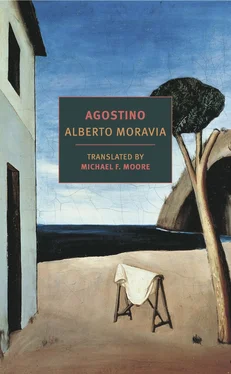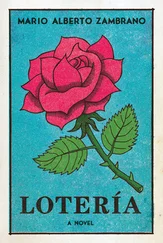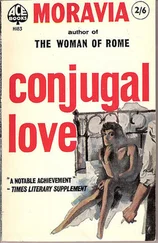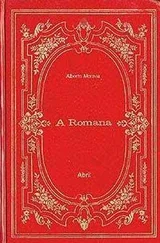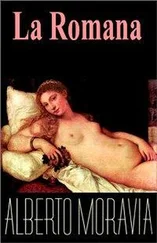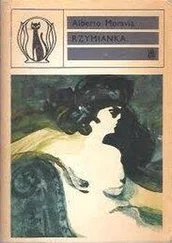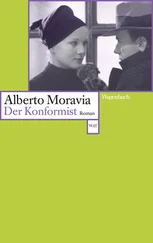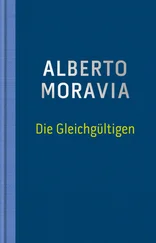Now, after his mother’s departure with the young man in the pattino , he compared the two events and found them identical. Like his cousin, his mother had been waiting for the right opportunity to abandon him. Like his cousin, and with the same breathless ease, she had accepted the first partner to come along. And in both cases, it had been his fate to fall from the summit of an illusion and crash to the ground, aching and bruised.
The mother stayed out on the water for a couple of hours that day. From under the beach umbrella he saw her step back onto the shore, hold out her hand to the young man, and with her head lowered under the noonday sun, make her leisurely way to the changing cabin. The beach was empty at that hour, a consolation for Agostino, who was still convinced that everyone was staring at them. “How did your morning go?” his mother asked indifferently. “I had a lot of fun,” Agostino began, and he pretended that he, too, had gone out on the water with the boys from the next cabin. But she had already stopped listening and was running toward the cabin to get dressed. Agostino decided that the next day, as soon as he saw the young man’s white pattino appear on the horizon, he would find some excuse to wander off and avoid having to suffer the insult of being left behind for a second time. But the next day, the minute he started to leave, he heard his mother calling him back. “Come,” she said, standing up and gathering their things, “we’re going for a boat ride.” Agostino followed her, thinking that she intended to send the young man on his way and spend the morning alone with him. The young man was standing on the pattino waiting for them. The mother said hello and added simply, “I am bringing my son, too.” And so a very unhappy Agostino found himself sitting next to the mother, facing the young man as he rowed.
Agostino had always seen the mother in one way: dignified, serene, and discreet. So he was bewildered, during the ride, to see the change that had taken place not only in her manner and speech but also apparently in her person, as if she were no longer the same woman. They had barely entered the open sea when the mother — in a sharp, allusive, and, to Agostino, obscure remark — began a strange private conversation. As far as he could tell, it concerned a girlfriend of the young man who had another more fortunate and acceptable suitor. But this was only a pretext and the conversation continued, insinuating, insistent, spiteful, malicious. The mother seemed the more aggressive of the two yet also the more defenseless. The young man took care to answer her with a calm, almost ironic self-assurance. Sometimes the mother seemed unhappy and even irritated with the young man, to Agostino’s delight. But a few seconds later, she would disappoint him with a flirtatious remark that destroyed this first impression. Or she would address the young man in a resentful tone of voice with a series of obscure criticisms. But rather than take offense, the young man, Agostino observed, wore an expression of fatuous vanity, and Agostino concluded that the reproach was only on the surface, a cover for an affection he could not grasp. Both the mother and the youth seemed to ignore his existence, as if he wasn’t there. She went so far with this display of neglect as to remind the young man that going out with him alone the day before had been a mistake on her part that would never be repeated. From now on the son would always be present — an argument Agostino considered offensive, as if rather than a person endowed with an independent will he were an object that could be moved about arbitrarily.
Only once did the mother seem to notice his presence, when the young man, suddenly letting go of the oars, leaned forward with an intensely malicious expression and whispered a short sentence to her that Agostino couldn’t make out. This sentence had the power to make the mother jump up with exaggerated outrage and feigned horror. “At least show some consideration for this innocent boy,” she answered, pointing to Agostino sitting by her side. Hearing himself called innocent, Agostino shook with repulsion, as if he had been struck by a dirty rag he couldn’t dodge.
When they were a good distance from the shore, the young man proposed that the mother take a swim. Here Agostino, who had so often admired the discretion and ease with which she usually slipped into the water, could not help but be bewildered and pained by the new gestures with which she embellished her former behavior. The young man had plunged into the sea and already reemerged while the mother was still hesitantly testing the water with her toes, feigning either fear or reluctance — it was hard to tell. She covered herself, protested, laughing and holding on to the boat. Finally she lowered a leg and a hip into the water in an almost indecent pose, and let herself fall awkwardly into the arms of her companion. The two of them went under together, and together they floated back to the surface. Agostino, huddled in a corner, saw the smiling face of the mother next to the tanned and serious face of the youth, and it looked to him as if their cheeks were touching. In the clear water you could see the two bodies rubbing against each other, as if they wanted to intertwine, bumping their legs and their hips. Agostino glanced at them, then at the distant beach, and felt embarrassed and in the way. At the sight of his frowning face, the mother, treading water, uttered a sentence that humiliated and mortified him for the second time that morning: “Why the long face?… Can’t you see how lovely the water is? Goodness, what a grumpy son I have.” Agostino did not reply, limiting himself to casting his eyes elsewhere. The swim lasted for a long time. The mother and her companion played in the water like two dolphins and appeared to forget him entirely. Finally they climbed back on board. The youth leapt up in a single bound and then leaned over to pull up the mother, who was imploring his assistance from the water. Agostino watched. He observed how the youth’s hands, in order to lift the woman, dug their fingers into her tanned skin where the arm is softest and widest, between the shoulder and the armpit. Then she sat down by Agostino, gasping for air, and with her pointed nails she pulled at her wet bathing suit so it wouldn’t adhere too closely to the tips of her nipples and the roundness of her breasts. But Agostino remembered that when they were alone, the mother, a strong woman, had no need of any assistance in climbing back on the boat, and he attributed her begging for help and the wriggling of her body — apparently indulging in a feminine clumsiness — to the new spirit that had already caused so many and such unpleasant changes in her. He could not help but think that the mother, a large and dignified woman, was feeling her size as an impediment she would gladly be rid of, and her dignity, a boring habit that she now needed to replace with some awkward playfulness.
Once the two of them were back on the boat, the return trip began. This time the oars were assigned to Agostino, while the mother and the boatman sat on the plank between the hulls. He started rowing very slowly, in the scorching sun, sometimes wondering at the meaning of the voices, laughter, and movements behind his back. Every so often the mother, as if remembering he was there, would reach out an arm and give him an awkward pat on the back, or tickle him under the arms, asking him whether he was tired. “No, I’m not tired,” Agostino would reply. When he heard the young man say, with a laugh, “It’s good for him to row,” he gave the oars a hard, angry tug. The mother leaned her head against Agostino’s seat and kept her long legs outstretched, this much he could tell, but he had the impression this position was not always maintained. At one point, he heard a scrambling and what seemed to be a brief struggle. The mother sounded like she was choking. She stood up, stammering something, and the boat tipped to one side. For a moment the mother’s belly rubbed against Agostino’s cheek. It felt as vast as the sky and was beating strangely, as if it had a life that didn’t belong to her or had slipped past her control. “I’ll sit back down,” she said, standing with her legs wide and her hands gripping her son’s shoulders, “if you promise to behave.” “I promise,” came the young man’s reply, with a false and playful solemnity. She lowered herself awkwardly onto the plank, brushing her belly against her son’s cheek. A trace of moisture from the wet bathing suit was left on Agostino’s skin and a deeper warmth seemed to evaporate the moisture into steam. Although he felt a sharp stab of murky repulsion, he obstinately refused to dry himself off.
Читать дальше
